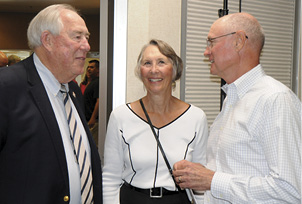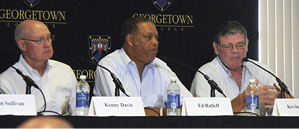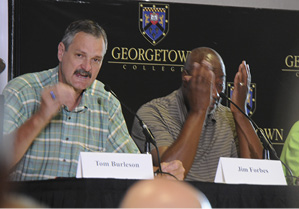Reunion of 1972 Olympic basketball team held at Georgetown

Kenny Davis, right, a member of the 1972 Olympic U.S.A. basketball team, chatted Friday with two other panel members of a seminar that was about to get underway, former U.K. player and Athletic Director C.M. Newton, and 1972 Olympic Gold medalist in diving, Micki King. Davis was a standout player for neighboring Wayne County High School before playing for Georgeown College, where he was a two-time All-American, later making the Pan American team in 1971 and the U.S. A. Olympic team in 1972.
by Al Gibson, Editor
They still feel the pain . . .
For most basketball junkies, the summer and fall months are spent tolerating the game of baseball and counting down the number of football games being played, all leading up to the start of yet another season of basketball competition.
This past summer, however, roundball fans – and in Kentucky, the numbers are certainly plentiful – were afforded a reprieve of sorts from the normal stretch of the year when basketball games aren’t usually being played.
The 2012 Olympic competition provided game after game after game of basketball to enjoy, all leading up to yet another U.S.A. Gold Medal performance with another Dream Team, this one led by NBA stars Kevin Durant, Lebron James and Kobe Bryant, capturing the championship with a 107-100 title game win over Spain.
The arrival every four years of the Olympic games provides basketball fans with plenty to cheer about, but it also serves as a reminder of what has often been referred to as the biggest travesty in sports- a championship gold medal round basketball game that has been commonly said to have been the “most famous basketball game ever played”.
In fact, the USA championship that was won over Spain just a few weeks ago, was the closest championship score since the 1972 finals that saw the two teams separated by a single point – either way you look at it, 50-49, or the official final score of 51-50.
Next month will mark the 40th anniversary of that Saturday night game that had Americans glued to their television sets, watching the boys wearing the USA uniforms – all amateurs, many still in college – going up against a group of men from the Soviet Union who were, in actuality, professional basketball players.
It was on September 10, 1972, when the game took place in Munich, Germany during an Olympics that had been tarnished by the killing of 11 Israeli athletes by Arab terrorists – an event that caused the Olympics to go through a two-day postponement of competition.
For basketball fans in Clinton County, that gold medal game had a special connection as well – with a “local” boy of sorts being placed on the team.
Wearing his red and white uniform for the neighboring Wayne County Cardinals, Kenny Davis had been a standout player in high school, and had later played for Georgetown (Kentucky) College, an NAIA school in Scott County where he was a two-time first team All-American and is still the all-time leading scorer for the Georgetown Tigers.
As that Olympic championship game played out, Davis and his 11 teammates on Team U.S.A. saw the team fall behind early, and trail by as many as 10 points in the second half, when a chain of events came together that would forever fuel questions about payoffs, scandals and just downright cheating.
With just three seconds remaining to be played, and having never been in the lead since the game began, U.S.A. player Doug Collins was heavily fouled while driving to the goal to attempt what would have been a go-ahead basket.
Collins, who enjoyed an illustrious professional career and is currently the head coach of the Philadelphia 76’ers, was rendered unconscious for a few moments after the hard foul.
After having been revived by team trainers from the hard foul by a Russian player, Collins stepped to the line to hit both free throws, setting the score in favor of the U.S.A. by a single point, 50-49, its first lead, with only three seconds remaining on the clock.
It seemed as if the U.S.A.’s then perfect record in basketball would advance to 64-0, and the gold medals would be placed around the neck of Davis and his 11 teammates.
The Russians immediately inbounded the basketball and missed a long desperation shot attempt, giving what would appear – at least momentarily – U.S.A. the victory.
But that’s when everything broke loose and the U.S.A. team was eventually denied its championship title – and the gold medals that would accompany that title.
In what has been blamed on a combination of human error, disregard for the international rules of the game and even downright theft, the Russians were given not one, but two more chances to win the game.
William Jones, the head of the international basketball federation (FIBA), who has since been accused of being “on the take” with an objective of seeing that any team other than the U.S.A. won the gold in basketball, came out of the stands and despite not having any actual authority over the games or the officials working the contest, ordered that three more seconds be placed on the clock.
Play resumed, and once again, the horn sounded signaling an end to the game, and once again, however, the Russians were allowed to inbounds the basketball with yet three seconds being placed back onto the game clock.
On that third attempt, the Russians’ Alexander Belov caught a floor-length pass, threw an elbow into an American defender, and laid the basket off the backboard and into the hoop for the game – and gold winning score.
Officially, the final score was 51-50 in favor of the Russians. In the hearts and minds of those 12 U.S.A. players who 40 years ago watched in disbelief as the Russians celebrated the win – the score was, and always will be, 50-49, in favor of the U.S.A.
The U.S.A. was cheated – not defeated.
The American players met at the end of the game in the dressing room, and agreeing that they were simply cheated out of the victory in this Cold War era game, they agreed that they had earned gold medals, and against the orders of the coaching staff, they refused to attend the medal awarding ceremony and in the 40 years since, those silver medals that the Olympic Committee say belongs to the team members, lay unclaimed in a vault at Olympic headquarters in Switzerland.
Davis, who led the charge to refuse acceptance of the silver medal, has even had it placed in his will that upon his death, neither his wife, nor his children, are to ever accept the silver medal on his behalf.
Last week, at his college alma mator, Davis played host in a three-day reunion setting, and for the first time since they stepped off of the plane after returning from Munich 40 years ago – all 12 members of the U.S.A. basketball team were together again.
In addition, the one and only surviving member of the three-man coaching staff, John Bach, was in attendance.
On Friday, the program included four separate panel discussions with three members of the team sitting in on each of the discussions, along with several other guest panelists.
It’s been said that time heals all wounds – but not so in the case of the 12 men who now are either at or near the 60 year old mark – when it comes to the pain they have endured for the past 40 years in not having been awarded what they so deservedly had earned – the gold medal and championship title.
They still feel the pain – and that quickly became evident Friday as the first of the four panel discussions got underway.
With about 100 people in the audience, it was the center from that 1972 team – 7′ 2″ Tom Burleson who was the first of the 12 players to take the microphone.
As he began telling of his Olympic experience and talked about the atmosphere in Olympic Village in the aftermath of the killings, Burleson broke down momentarily while speaking, and had to pause for a few seconds to regain his composure.
But that wasn’t the most tell-tale sign that the day would be not only a special gathering for everyone in attendance but also would give everyone a perspective on that most famous basketball game ever played that had never before been presented in such a grande fashion.
Seated to Burleson’s immediate left was fellow teammate Jim Forbes, a 6′ 8″ mountain of a man whose hand completely enveloped the hand of this writer’s during a post-seminar handshake. Forbes, who played for the University of Texas El Paso (UTEP) while making the Olympic squad, had also been a member of, like Davis, the U.S.A. team in the Pan American games the previous year.
As Burleson spoke of a “beautiful journey” noting that he could not have ever “dreamed a better life”, and the feeling he had of being cheated out of claiming the gold medal, Forbes removed his glasses and began sobbing into those huge hands that were now covering his eyes.
The third teammate on that first panel – Tom Henderson, had to turn his head to keep from breaking down at that same instant.
It was obvious – this was going to be a special day, but one question had quickly been answered.
They still feel the pain.
Speaking about getting to represent his country as an athlete on the Olympic basketball team, Burleson said it was simply a tremendous honor that he will never forget.
“Being an Olympic athlete is a tremendous honor, and it was the greatest thing that ever happened to me in my life,” he said. “That moment of being an Olympic athlete, and walking into the Olympic Stadium, that’s still my greatest thrill as an athlete.”
Burleson also described the chaos the team and staff went through during those final minutes in 1972 when the game was played out to an ending – three times.
“The game was like life, mistake after mistake was made, from the scorers table, to the referees to the committee people coming out of the stands, to put time back on the clock, it was a mistake,” Burleson said.
Another teammate on that 1972 squad, Jim Forbes, agreed that the final scene, as it played out, was that of confusion, but like the rest of the team, and the country for that matter, he would always know that the Americans had won the game outright, and deserved to be awarded the gold medal.
“The end of that game was just mass confusion,” Forbes said. “It was a bona fide mess – we never lost that game. To me, the score will always be 50-49 – we did what we had to do.”
Forbes went on to note, however, the irony of the situation, resulting in the 12 members of the 1972 squad still enduring a significant degree of notoriety because of the way the game ended.
“What’s ironic is that if we had won that game, then none of us would be sitting here, we’d just be another bunch of gold medal winners,” Forbes said.
Davis, who through the years has been the most outspoken about not accepting a silver medal that the squad didn’t deserve, told those attending Friday’s seminar that during a gathering the night before, on Thursday night, the question was again addressed by the entire squad.
Speaking about a session that was filmed by ESPN the night before Fridays public forum, Davis recalled that everything finally led up to “the question” of whether or not the team would accept the silver medals today.
“There was some discussion as to whether we should or whether we shouldn’t, but in the end, it was unanimous.” Davis said. “It was unanimous last night, it was unanimous 40 years ago, and I think if we live another 40 years, it will still be unanimous – no we’re not going to accept those silver medals.”
Davis further explained that by not accepting the silver medals, the team wasn’t being “sore losers”, but instead, in their eyes, they didn’t deserve the silver because they had won the game and had earned the gold.
“If we had lost the game, according to the rules, we would have proudly stood there and accepted that silver medal, I’ve never ever run into anybody yet that has said to me, ‘you need to take that silver medal,'” Davis said. “We know that according to the rules that that game was played under, we won, so if we never, ever get that symbol, then that will be okay.”
The Wayne County graduate went on to put the 1972 team’s misfortune into a much, much deeper perspective – one that was repeated several times during the day.
“Every time that we start to feel sorry for ourselves, that we don’t have the gold medal, all we have to do is think about those Israelis.” Davis said. “That just puts it in perspective. We came home, started families, established careers, we are all still alive – they took those kids out of there in caskets.”
As for having the clause placed in his will that directs his wife and children to never accept the silver medal after his death, he noted that he had not intended for that to become public knowledge, but he remains steadfast that none of his children or their descendants are to ever accept the silver medals from the Olympic Committee.
“It was almost the spur of the moment that I did it and it’s really gotten more publicity than I wanted it to get,” Davis explained. “It got out and it’s kind of taken a life of its own.”
Last week’s reunion schedule included a host of special events that saw the group attend a Lexington Legends baseball game, play golf together and be recognized during a private banquet on Saturday night, in addition to Friday’s public forum seminars.
Several of the team members said that for the first 16 years or so, they would be contacted every four years by the Olympic Committee, urging them to accept the silver medals. Most said they simply ignored the request. Several years ago, the contacts quit coming and supposedly, those 12 silver medals still lie in storage in Switzerland – and apparently will continue to lay unclaimed in that Olympic vault.
For Davis and his fellow teammates, all have enjoyed highly successful careers and adult lives.
Davis has spent nearly four decades working with Converse. Most had stints as NBA players before moving on to other careers that have included coaching in the high school college and NBA ranks. Others have had careers that have ranged from Wall Street trader (Kevin Joyce) to a member of the U.S. House of Representatives (Tom McMillen).
One question was certainly answered for everyone attending last week’s Courage in Munich reunion… time does not heal all wounds.
For these 12 men, who 40 years ago were just three seconds away from realizing their dream of standing on that podium, hearing the Star Spangled Banner being played over the loudspeakers and having those gold medals placed around their necks – only to have that dream stolen from them in Munich Germany…
They still feel the pain.
Click on the links below to download the movies from the event.


Tom Burleson, left, the 7′ 2″ center for the 1972 U.S.A. Olympic basketball team, was the first team member to speak at a seminar last week in Georgetown College during the 40th anniversary reunion, and he immediately became very emotional about his Olympic experience. His teammate, Jim Forbes, broke down during the discussion while listening to Burleson’s words.



